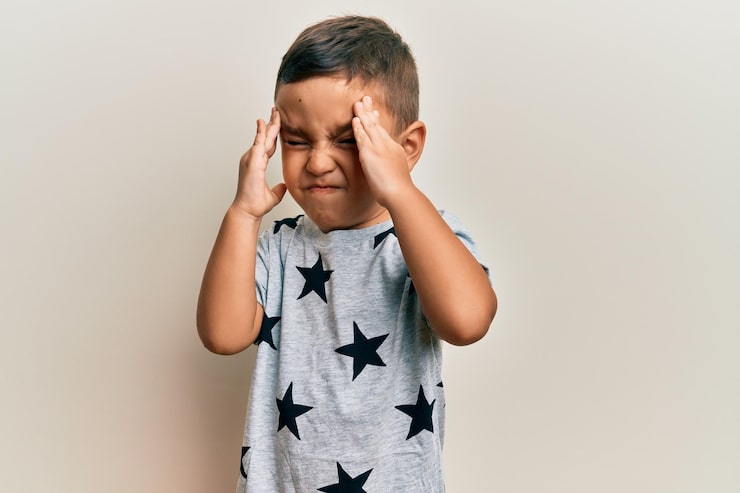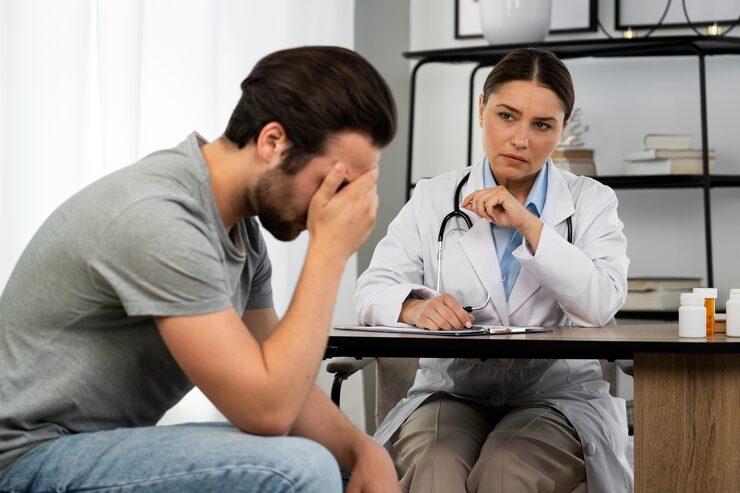
woman suffering from headache
Most people don't know that head injuries happen more often than they think. They can occur from a fall, a sports injury, a car accident, or a sudden impact. Some head injuries cause damage right away that can be seen, but others, like a concussion, can be much harder to find. A concussion might not seem like a big deal at first, but if you don't get it treated, it can cause serious problems.
Knowing the signs of a concussion is very important for getting the right treatment and recovery. This blog will help you spot the signs of a concussion, know when to go to the doctor, and learn how hospitals treat this condition.
A concussion is a mild traumatic brain injury (TBI) that happens when the head gets hit, bumped, or jolted suddenly, or when any force makes the brain move quickly inside the skull. This movement can alter the chemicals in the brain and temporarily disrupt its normal functioning.
People often say that concussions are "mild," but they should never be taken lightly. Long-term cognitive, emotional, and physical problems can happen if you have multiple concussions or wait too long to get treatment.
Anyone can get a concussion, but they are most common in:
Symptoms of a concussion can show up right after the injury or take hours or even days to show up. They can affect how you think, feel, and move.
1. Symptoms of the body
2. Cognitive (Thinking) Symptoms
3. Changes in Behavior and Mood
4. Problems with sleep

kid suffering from headache
It can be harder to tell if a young child has a concussion. Some signs include excessive crying or irritability.
Some signs may mean that the brain injury is worse and needs immediate medical attention. If the injured person has any of the following, call 911 or go to the hospital right away:
Doctors begin by examining the patient's symptoms, medical history, and the details of the injury. Some common steps are:
1. A physical exam
To assess brain function, the doctor examines reflexes, balance, coordination, and how the brain responds to various stimuli.
2. Testing of the brain's ability to think
To assess how well the brain is functioning, short-term memory and concentration tests may be administered.
3. Tests that use images

man suffering from head ache with a doctor
There is no one "cure" for a concussion, but getting enough sleep and seeing a doctor are important parts of getting better.
1. Rest at first
The brain can heal when you give it a break from work and play. This means limiting activities such as reading, watching TV, driving, or playing sports for the first few days.
2. Slowly getting back to normal activities
Doctors recommend that people gradually return to their normal routines once their symptoms improve. They should start with light activity and work their way up to full participation.
3. Medicines
You can take acetaminophen to help with headaches, but don't take anti-inflammatory drugs like ibuprofen or aspirin unless your doctor tells you to. These drugs can make bleeding more likely.
4. Care After the Event
To monitor symptoms and prevent complications, hospitals often schedule follow-up visits. In some cases, you may need to see a neurologist or a concussion specialist.
Most people get better in a few weeks, but if you don't get treatment or have more than one concussion, you could have long-term problems like:
You can't avoid every accident, but you can take steps to lower your risk of getting a concussion:
1. Is it possible to have a concussion and not pass out?
Yes. A lot of people who get concussions don't lose consciousness. Most concussions are mild and don't make you faint.
2. How long does it take to get better?
Most people recover within 2 to 4 weeks, although the recovery time can vary. Resting and gradually returning to your normal routine will help you heal more quickly.
3. Is it okay to let someone sleep after a concussion?
Yes, as long as they are awake, aware, and not getting worse. However, be sure to check on them periodically to see if anything has changed.
4. Can whiplash cause concussions?
Yes. When the neck or head jerks suddenly, like in a car accident, the brain can move inside the skull and cause a concussion.
5. Are kids more likely to get hurt?
Yes. Children and teenagers are at a higher risk because their brains are still developing, and it may take them longer to recover.
A concussion may not seem like a big deal, but if you don't take care of it right away, it can have serious effects on your brain. It's very important to recognize the warning signs, such as headaches, dizziness, confusion, and sensitivity to light, and to seek medical help right away.
Hospitals play a crucial role in diagnosing patients' conditions, monitoring their health, and facilitating their safe recovery. Most people recover and return to their normal lives without any lasting effects if they take care of themselves, get enough sleep, and avoid contracting illnesses.
If you're not sure, get checked out. It's always better to be safe and see a doctor after a head injury than to ignore signs that could mean something is wrong.
We offer expert care across key specialties, including Medicine, Cardiology, Orthopaedics, ENT, Gynaecology, and more—delivering trusted treatment under one roof.
Prakash Hospital Pvt. Ltd. is a 100 bedded NABH NABL accredited multispecialty hospital along with a center of trauma and orthopedics. We are in the service of society since 2001.
OUR SPECIALITIES
Contact Us
D – 12A, 12B, Sector-33, G. B. Nagar, Noida, Uttar Pradesh 201301
+91-8826000033

© 2026 All rights reserved.
Designed and Developed by Zarle Infotech